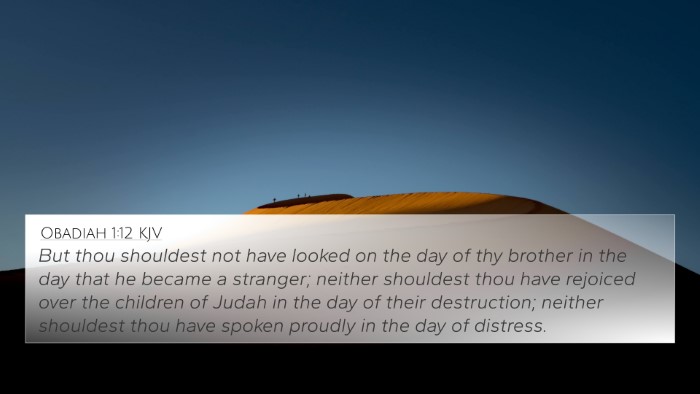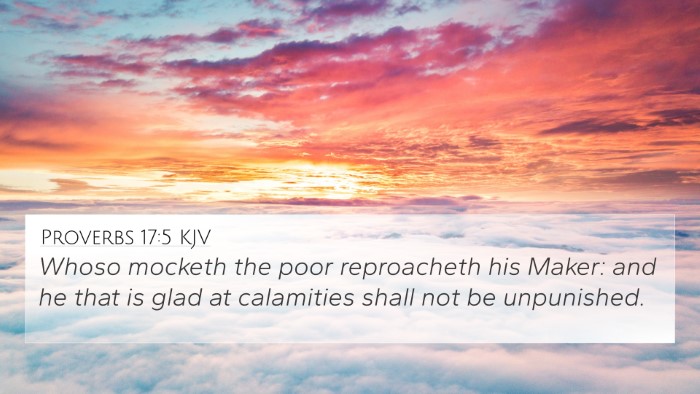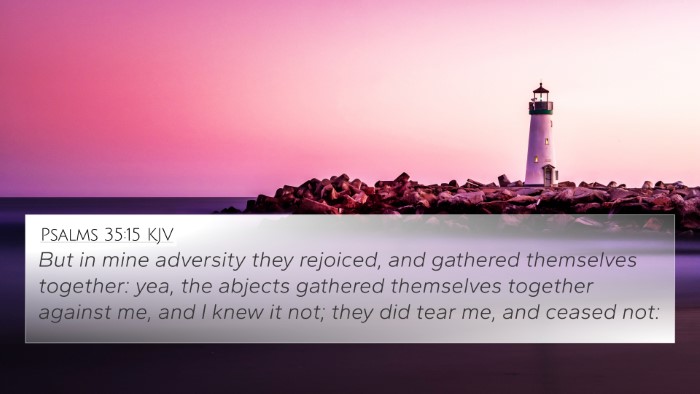Understanding Proverbs 24:17
Proverbs 24:17 states: "Rejoice not when thine enemy falleth, and let not thine heart be glad when he stumbleth:"
Summary of Insights
This verse cautions against the natural human tendency to rejoice at the misfortunes of others, particularly one's enemies. The underlying principle reflects the moral and ethical considerations of our attitudes toward others, emphasizing that true wisdom and righteousness dictate a compassionate response, even towards those who may oppose us.
Interpretative Insights
Commentaries by Matthew Henry, Albert Barnes, and Adam Clarke provide valuable insights into this verse.
- Matthew Henry: He emphasizes the importance of a gracious spirit. According to him, celebrating the downfall of an enemy indicates a heart filled with malice and resentment. Instead, the ideal response should be one of sorrow for their plight, urging a higher standard of morality that reflects God's love and justice.
- Albert Barnes: Barnes reflects on the idea of divine justice and the perception of our enemies. He suggests that witnessing an enemy's misfortune should offer the observer a chance for reflection rather than joy, as true believers ought to demonstrate mercy, paralleling the teachings found in the New Testament (Matthew 5:44).
- Adam Clarke: Clarke highlights the broader moral implications of the verse, associating it with personal growth. He argues that rejoicing over an enemy's failure can lead to spiritual dangers, urging the faithful to focus on forgiveness and understanding rather than vindictive glee.
Cross-References to Consider
Proverbs 24:17 connects with various other scriptures that deepen the understanding of this teaching. Here are some relevant cross-references:
- Romans 12:19: "Dearly beloved, avenge not yourselves, but rather give place unto wrath: for it is written, Vengeance is mine; I will repay, saith the Lord."
- Matthew 5:44: "But I say unto you, Love your enemies, bless them that curse you, do good to them that hate you, and pray for them which despitefully use you, and persecute you."
- Luke 6:28: "Bless them that curse you, and pray for them which despitefully use you."
- Proverbs 17:5: "Whoso mocketh the poor reproacheth his Maker: and he that is glad at calamities shall not be unpunished."
- James 4:10: "Humble yourselves in the sight of the Lord, and he shall lift you up."
- Galatians 6:1: "Brethren, if a man be overtaken in a fault, ye which are spiritual, restore such an one in the spirit of meekness; considering thyself, lest thou also be tempted."
- Proverbs 20:22: "Say not thou, I will recompense evil; but wait on the LORD, and he shall save thee."
Thematic Connections
Exploring the connections between these verses reveals a consistent biblical theme: the call to embody grace and mercy in all our interactions, even with adversaries. Understanding these connections provides deeper insight into the heart of Christian teaching and the significance of maintaining a compassionate disposition.
Conclusion
Proverbs 24:17 serves as a reminder of the high moral calling to respond with love rather than vindication. Through the lens of cross-referencing biblical texts, one can see the cohesive teachings that Jesus and the apostles brought to the forefront, encouraging followers to pursue peace and understanding in the wake of conflict.
SEO Considerations
Readers may find this analysis useful in exploring Bible verse cross-references and examining connections between Bible verses. Engaging with these thematic Bible verse connections allows for a richer understanding of the scriptures and provides tools for cross-reference Bible study.
Additional Tools for Study
To delve deeper into Bible concordance or explore comprehensive Bible cross-reference materials, readers are encouraged to utilize available resources and methods for cross-referencing Bible study that enhance their study of the Scriptures.











